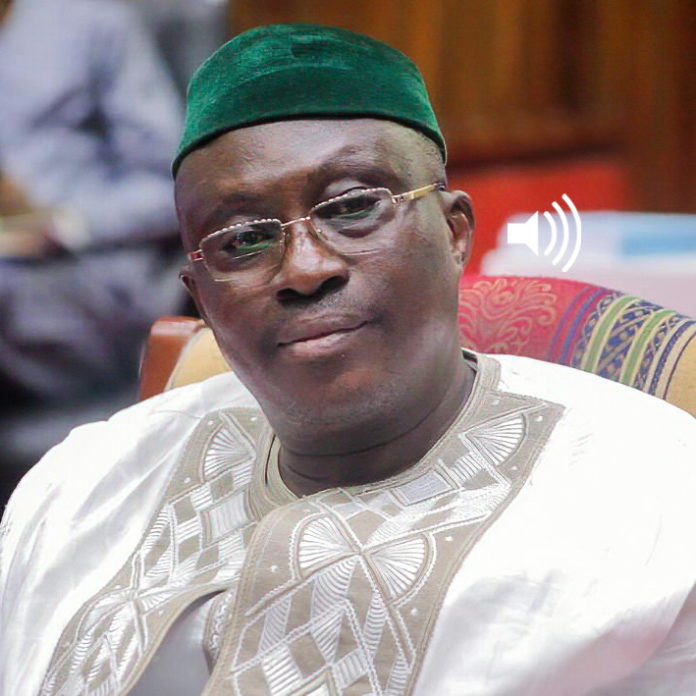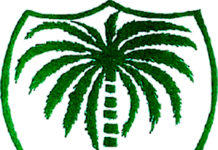
It is important that some public education be done on the state of economic affairs in Sierra Leone from time to time. Such education keeps the public better informed of economic progress and contemporary issues. In this piece, I attempt to answer 3 questions; where are we coming from? where are we now and where are we going?
Where are we coming from?
This Government inherited a baseline situation characterised by a high level of poverty, huge domestic and external debts, huge arrears to suppliers, double digit inflation, low domestic revenue collection, poor financial management and corruption as well as the poor relationship with partners including the IMF and the World Bank.
As of 2018, according to the Sierra Leone Integrated Household Survey (SLIHS), poverty remains high in Sierra Leone with the official poverty rate at 56.8% in 2018. This literally means out of every 10 households in Sierra Leone, 6 are poor. This could mean they have no means of livelihood. In street economics, this could mean they had no sustained access to ‘bread and butter’.
Total external debts in 2018 were estimated at over US$1.6 billion, domestic debts of about US$650 million and verified arrears to suppliers estimated at about US$340 million. The total revenue (including grant) GDP ratio was estimated at 14.8% in 2017. Before 2018, not more than 60% of the national budget was financed from domestic revenue. The reported average daily revenue collected was barely 10 billion Leones before April 2018 putting the average domestic revenue collected for 22 working days at 220 billion Leones. This was far insufficient to meet the monthly domestic wage bill of about 250 billion Leones and debt service of about 100 billion Leones. This obviously warranted bank financing of the persistent huge fiscal deficit.
Between 25-30% of government revenue is spent on debt service monthly. This means that since 2018, on average, for every 100 billion Leones collected monthly, 30 billion Leones (equivalent to the construction of 30 schools with each having 6 classrooms, office, store, WASH facilities and furniture for 300 pupils) is used to service debt.
Inflation was about 18% and the exchange rate of about 7,500 Leones to US$1. Two large scale mining companies were closed for various reasons. IMF had ceased funding because of economic indiscipline and by extension, all partners withdrew or slowed down operations in Sierra Leone. There was no policy programme with the IMF. All budgetary support from the World Bank, EU and ADB were withheld.
Where are we now?
The thrust of our economic management is fiscal consolidation (increasing revenue and efficiently managing expenditure) for human capital development and job creation. Economic Growth was estimated at 5.4% in 2019 compared to 3.5% in 2018. Total revenue (including grant) GDP ratio increased from 14.8% in 2017 to 17.7% in 2019. In 2019, about 75% of the national budget was financed by domestic revenue. Average daily domestic revenue collected increased to about 20 billion Leones and by extension monthly revenue collection for 22 working days estimated at 440 billion Leones. The wage bill of around 250 billion Leones, plus 100 billion Leones for debt service, means that, currently, Government has about 90 billion Leones for other recurrent and capital budget financing. Although this is not enough, it has enabled us to seamlessly manage the economy. Due to the strong leadership of the President and effective fiduciary management, Sierra Leone has attracted huge budgetary support and project financing that has enabled us implemented ambitious development projects in water, electricity, roads, education and health with minimal recourse to bank financing.
Inflation progressively reduced from 18% in 2018 to about 11% slightly over 10% in November 2020 and is expected to be in single-digit by the end of 2021. We experienced an exchange rate depreciation of about 10-15% in 2018 due largely to weak export capacity but has been fairly stable since October 2019. External reserve that was estimated at 3.5 months of imports in 2018 substantially increased to nearly 5 months of imports by the end of 2020 and the exchange rate has remained stable for over 15 months now.
We were able to normalise relations with the IMF in 8 months of our administration and started implementing the current IMF Extended Credit Facility (ECF) programme. During the last review of the ECF, we met all quantitative benchmarks and structural conditions.
As we were about consolidating gains in economic recovery in 2020, we had the pandemic COVID-19 affecting all aspects of economies in the world. In Sierra Leone, GDP declined by 2.6% slightly less than the initial projection of 3.3% as a result of COVID-19 with tourism as the hardest hit sector. Revenue declined by at least US$100 million by the end of 2020 while public spending on health increasing considerably.
In response to the COVID-19, the Government developed
1. The Health Response Plan aimed at prevention, detection and management of the virus. 2. The Quick Action Economic Response Programme aimed at managing the economic fallout of the pandemic.
The government continues to be the single largest funding entity on COVID-19. As of the end of December 2020, Government has spent nearly US$40 million on the prevention, detection and treatment of corona cases. Partners have also collaborated with Government to roll out these plans and have contributed resources through realignment of existing projects and new funding. Despite all these, Government has been able to pay salaries to public sector workers on time, service expenses of Ministries, Department and Agencies, provide safety nets to vulnerable groups and undertake development projects including electricity, water supply, roads, agriculture and support to SMEs.
Recognising the challenges ahead, this Government had to mobilise concessional financing to continue to finance COVID-19 response, short term priorities and medium-term priorities to lay the foundation for sustainable development. As stated in the 2021 Budget Statement, Paragraphs 5 and 6, “the impressive economic programme and management under President Bio’s Administration have considerably restored development partners’ confidence in Sierra Leone. This is evidenced by the amount of external resources mobilised since 2018. Total resources mobilised from International Financial Institutions (IFIs) increased from US$46.3 million in 2018 to US$438.4 million in 2019 and US$380.7 million between January and October 2020. Overall, of the total resources mobilised between April 2018 and October 2020 amounting to US$865.4 million, grants accounted for 66.1 per cent. Additional grant resources amounting to US$543 million were mobilised from bilateral partners and the UN agencies. An estimated US$103 million was channelled through NGOs. The government has once again passed the Millennium Challenge Cooperation (MCC) scorecard. In the 2021 Scorecard, which assessed performance in 2019 and 2020, Sierra Leone passed 13 indicators up from 11. This is the highest number of indicators Sierra Leone has ever passed on the MCC scorecard. The consecutive passing of the scorecard has increased our chances of being considered for the MCC Compact that would make available substantial financial resources for the implementation of transformational development projects”.
The government’s commitment to implementing policies measured by the MCC is not merely about passing. We implement these policies because we believe they are critical for the development of our country and the transformation of the lives of our citizens.
The overall budget deficit, including grants, as a percentage of GDP, the MCC’s standard measure of the stance of fiscal policy, was 8.8 per cent in 2017. Following the adoption of fiscal consolidation measures upon assuming office, the deficit narrowed to 5.6 per cent in 2018 and declined further to 3.1 per cent in 2019. The MCC score on fiscal policy improved from 4.0 per cent in 2017 to 18.8 per cent in 2020, showing marked progress in this Administration’s management of the nation’s finances. We will continue to pursue prudent fiscal policies and implement radical but necessary reforms in our public financial management.
Where are we going?
The Medium-Term National Development Plan 2019-2023 and the 2021 Budget with the theme “Economic Recovery for Job Creation and Human Capital Development are the current instruments for translating President Bio’s dream to reality.
Reducing poverty or providing bread and butter remains the overarching objective of our economic management. This can be principally enhanced through jobs – formal or informal and support to vulnerable groups. The question this piece attempts to answer is to what extent the current and planned public policies of this Government supports livelihoods or ‘bread and butter’.
First, the Free Quality School Education (FQSE) provides immediate savings for families who used to spend on tuition, books and transportation. Assume a family with 3 school going children spending about 1.5 million Leones on tuition and books. Also, assume that the family lives around Lumley and the children used to pay 10,000 Leones each for transportation to and back from St. Edwards or Prince of Wales. This means for 20 school days in a month, this family will pay 200,000 Leones for a child and 600,000 Leones for the 3 children. With the school bus introduced, each child pays now 4 Leones to and back to school. This means that the same family now pays 80,000 Leones per child for 20 school days and 240,000 Leones for 3 children. Effectively, the school bus now creates a savings of 360,000 Leones for that family for every 20 school days in a month. For a year (assuming 9 months of schooling), the family now saves 3,200,000 Leones which again can be used for private consumption and investment. Adding savings from tuition waiver and books of 1.5 million Leones brings a total household saving of 4.7 million Leones approximated at US$500 per year about the minimum loan size provided by Munafa Fund.
Second, the incomes policy of this Government includes raising the salaries of workers, raising the minimum wage and minimum pension. Since 2018, this Government has raised the salaries of health workers by over 100%, teachers by over 50% and the general workforce by at least 20%. By April this year, the Government will also increase salaries for all security personnel and staff of tertiary institutions. The government increased the minimum wage from 500,000 Leones to 600,000 Leones and minimum pension from 5,000 to 250,000 Leones.
At least 7,000 teachers and health workers have been brought on the payroll. With the average household size of 6 persons, this means at least 42,000 persons will benefit from this recruitment. In addition to recruitments in the Police, Teacher Service Commission and many other MDAs can bring the number of jobs created in MDAs to over 20,000.
Also, Chairmen and Mayors and their deputies are now paid salaries and by extension liable to end-of-service benefits (gratuities and pension). Sitting fees for local councillors has been increased by 50% and salaries of staff of local councils have been increased to the level of their counterparts in the central government. All paramount chiefs and their speakers now receive salaries. Biometric verification of core staff of chiefdom councils has been completed and Government will soon commence providing salaries for at least 10 functionaries per chiefdom. Additionally, Government in 2019, reduced the top marginal personal income tax rate from 35%to 30% thereby increasing the disposable income of workers and increasing savings.
Third, this Government has embarked on planned infrastructure development including electrification and provision of pipe-borne water to district capitals as well as road construction. Work has either started or about to commence in all districts. Besides the social benefits of these, it is expected it will yield positive economic benefits through direct employment for our youth thereby providing them with ‘bread and butter’.
Also, the pavement of township roads in Freetown, Kenema, Bo, Bonthe and Waterloo and completion of major highways has commenced. Whilst Government is conducting feasibility studies for 25 trunk roads across the country, spot improvement and regravelling work on 40 roads in all districts commenced in December 2020. This massive road work will increase accessibility and rural connectivity with positive implications for agricultural and trade development.
All these infrastructure development is expected to generate over 50,000 jobs across the country thereby enhancing the livelihood for 50,000 households and benefitting over 300,000 persons.
Fourth, as part of the Quick Action Economic Recovery Programme (QAERP), Government has recently launched and will soon commence rolling out the Munafa Fund that will provide finance for youth and women in small businesses and artisan activities. It is projected that at least 10,000 jobs will be created through this scheme in 2021 and this will be increased yearly.
Fifth, the Government has acquired huge quantities of tractors and other farm implements. These tractors will be readily available for the 2021 planting season. Funds were also made available for cultivation from the budget and realignments of projects to address the consequences of COVID-19. It is expected that farm yields in 2021 will be very encouraging despite the coronavirus.
Meanwhile, Government is finalising a major policy shift in agriculture towards the private sector for input supply and tractor management after over 50 years with failed public sector leadership in input distribution. In 2021, the Government intends to disengage in seed and fertiliser supply and provide credit to the private sector to engage in such business. In the medium-term, the Government’s role in the input will be restricted to certification and regulation. Mindful of the weak private sector and challenges of accessing commercial bank lending, Government will create a special credit facility for agricultural service providers that will replace Government in input provision. In the Medium-Term, Government will strengthen the Farmer Services association (FSAs, link them to community banks and establish Agricultural Investment Bank to provide credits to service providers. Also, tractor management has been in the hands of chiefs and community-based organisations will be shifted to the private sector. The government will lease tractors to private service providers for lending to farmers at an affordable cost. The service providers will have the responsibility for managing and maintaining the tractors.
At the same time, the Government has just signed an agreement for large scale private sector farming in Kaffu Bullom and Samu and is finalising a similar agreement for Torma Bum in the South. All these efforts will increase self-sufficiency in food production, reduce import bills on food, create jobs and increase foreign exchange earnings.
In 2021, the economic focus will be on investing in infrastructure to attract private capital into agriculture, marine, mining and tourism sectors thereby creating jobs and increasing domestic revenue mobilisation from these sectors.
We are making progress.
Jacob Jusu Saffa, Minister of Finance.




